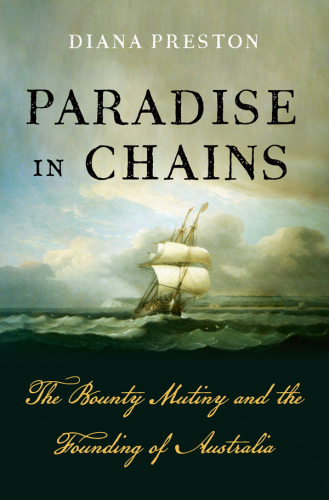
Paradise in Chains
The Bounty Mutiny and the Founding of Australia
کتاب های مرتبط
- اطلاعات
- نقد و بررسی
- دیدگاه کاربران
نقد و بررسی

September 11, 2017
British historian Preston (Lusitania) examines the British era of discovery in the South Pacific and the people who, willingly or not, endured severe privations during this episode. Tracking the paths of the infamous Bounty and of Mary Bryant, a convict transported to the New South Wales penal colony who later escaped, Preston colorfully evokes the claustrophobia and isolation faced by seafarers. At the tale’s center sits Tahiti, where the British sought breadfruit saplings to grow in Australia. The island captured sailors’ attentions for a different reason; after overthrowing Vice Adm. William Bligh, Bounty mutineers risked returning to Tahiti “because they lacked women and each wanted to obtain one.” Preston explores the socioeconomic conditions in Britain that led to convict transport becoming an attractive policy, but Australia and the fledgling colony there get short shrift. The enduring legacy of colonialism is reflected in the life of Bennelong, one of a handful of Aboriginals who spent time in England and whose “experiences and treatment seem to have left him stranded between two societies.” Preston’s heart is with the oceanic adventurers, and readers will be titillated by tales of derring-do, but those seeking a more comprehensive history of Australia or the South Pacific should look elsewhere. Agent: Bill Hamilton, A.M. Heath Literary (U.K.).

September 15, 2017
A British historian recounts the links between the founding of the British penal colony in Australia and the mutiny on the Bounty.Preston (A Higher Form of Killing: Six Weeks in World War I That Forever Changed the Nature of Warfare, 2015, etc.) narrates the story of three remarkable open-boat journeys. The first was occasioned by mutiny, the second by escaped convicts, and the third by shipwreck. William Bligh (1754-1817) was part of two other mutinies: the great naval mutiny in 1797, when aggrieved sailors removed their captains from a number of ships on Britain's coast, and his deposition by subordinates as governor of the Australian penal colony in 1808. The story of Bligh's 3,600-mile open-boat journey to Timor in 1789 is well-known, but two others made similar voyages not long after. Almost two years to the day, nine convicts, escapees from Port Jackson penal colony in Botany Bay, landed at the same place on Timor. Their 10-week trek covered more than 3,200 nautical miles of hazardous seas. The third trek was led by the captain of Pandora, a ship sent to find and arrest the Bounty mutineers. She sank in the Great Barrier Reef, but dozens of the ship's company, as well as 10 captured mutineers, survived the trip to Timor in four boats. Ultimately, this is a book about survival, and the author engagingly recounts the nearly impossible task of trying to establish a penal colony with few supplies and poor agricultural conditions. Preston shines in her description of the true nature of Capt. Bligh, who skimmed, cheated, cut rations, and stole supplies. Still, it seems greed was the least of his faults. He also had an explosive temper and was uncommonly harsh, abusive, and even tyrannical. His manner was consistently aggressive, and he seemed to completely lack empathy, intuition, or insight. A wonderful look into the beginnings of Australia and the remarkable strength of the survivors of these dangerous voyages.
COPYRIGHT(2017) Kirkus Reviews, ALL RIGHTS RESERVED.

October 1, 2017
Returning to the South Seas setting of A Pirate of Exquisite Mind: The Life of William Dampier (2004), Preston recounts two intertwined events of 1788, the founding of Australia and the voyage of the Bounty. With the loss of their American colonies, where hitherto convicts had been transported, British officials sought a new penal destination; hence, Australia. With slaveholders in the West Indies clamoring for cheap nutrition for their laborers, an expedition to collect breadfruit from Tahiti was proposed; hence, the Bounty. Describing the preparations and leaders of each voyage, Preston introduces Arthur Phillip, who turned out to be a competent leader of the convict fleet, and William Bligh, who was given command of the breadfruit boat. The controversies that surround Bligh unfold as Preston details the Bounty's arduous journey and emphasizes an obtuseness in Bligh that rendered him oblivious to dissension among his crew. Culminating with the aftermath of the famous mutinyBligh's checkered subsequent career and the fates of the mutineersPreston delivers an eminently engaging account of Britain's discovering voyages to the South Pacific.(Reprinted with permission of Booklist, copyright 2017, American Library Association.)

























دیدگاه کاربران